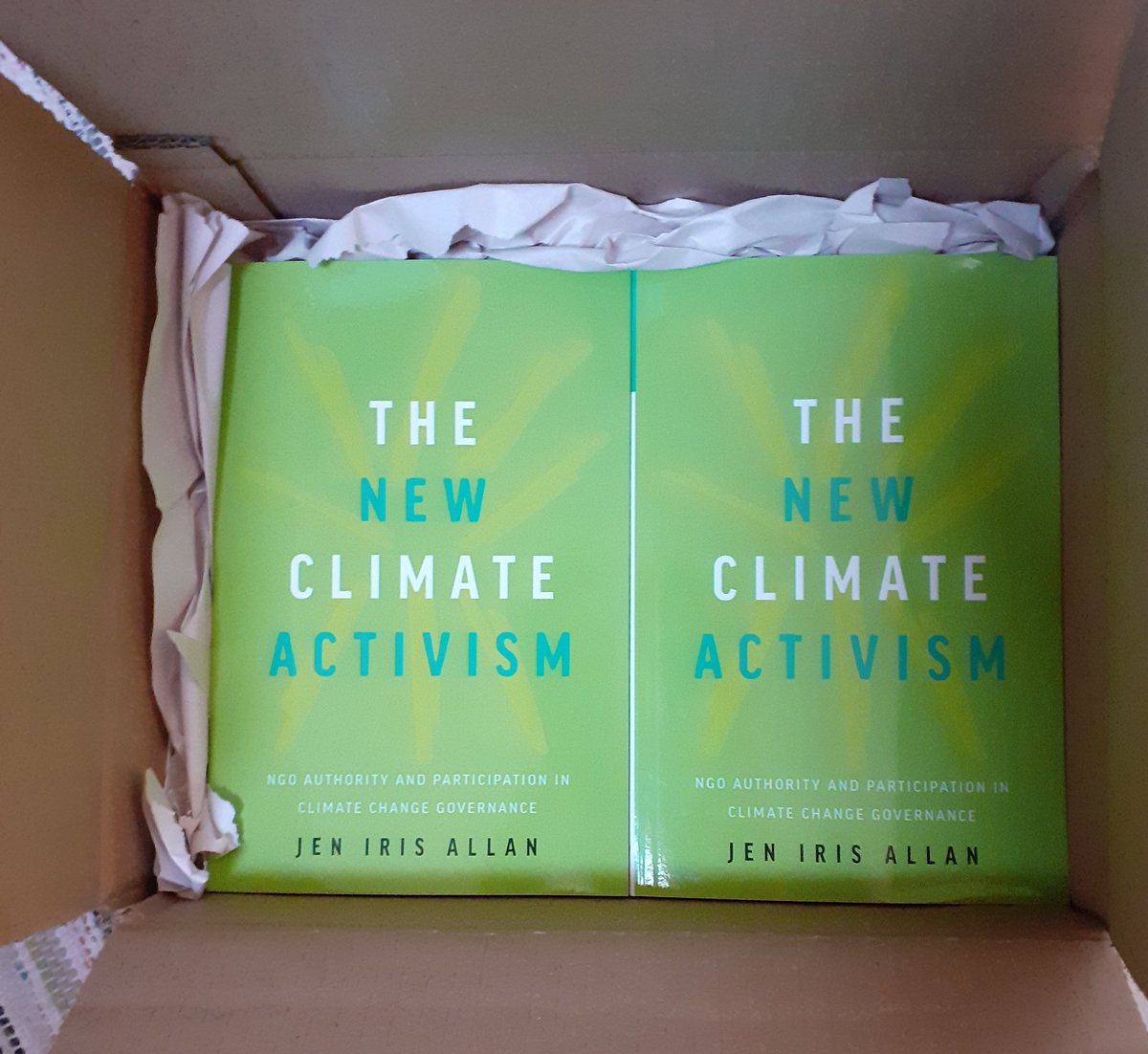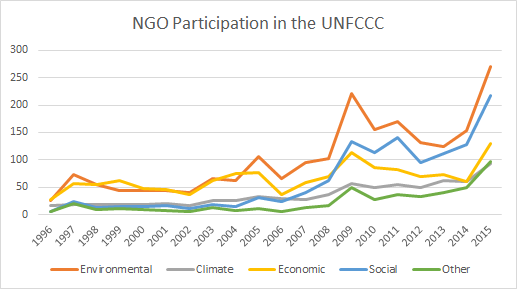Whoa! Thanks for all the support.
I guess I should say what the book is about, eh?
Here goes:
I guess I should say what the book is about, eh?
Here goes:
It asks why do activists take on a cause when they have no prior experience or expertise in that issue?
Specifically, I'm interested in the organizations you see in this blue line.
Yup, I coded all NGOs that ever attended a @UNFCCC COP. The things we do for a PhD...
Anyway, that line is NGOs that usually deal with social issues - gender, labour, Indigenous rights, justice, etc
Yup, I coded all NGOs that ever attended a @UNFCCC COP. The things we do for a PhD...
Anyway, that line is NGOs that usually deal with social issues - gender, labour, Indigenous rights, justice, etc
But, Jen, you say - of course social movements would take on the climate crisis - they're connected!
Yes, now we know that. But we didn't always.
The Kyoto Protocol doesn't mention people. Climate change was a faraway, environmental problem. Humans didn't factor in really.
Yes, now we know that. But we didn't always.
The Kyoto Protocol doesn't mention people. Climate change was a faraway, environmental problem. Humans didn't factor in really.
That changed in the mid-2000s. The @IPCC showed that climate change was here & now (er, then). There was the "adaptation turn" (see @schipper_lisa) - new rules for addressing the impacts of climate change.
Rules around forests (aka REDD) started to emerge. People were affected
Rules around forests (aka REDD) started to emerge. People were affected
Social movements & NGOs started to show up to climate meetings. They wanted to "be on the right side of history."
It was strategic too.
It was strategic too.
Many were stuck in the WTO stalemate in the mid-2000s. Not much was happening in global governance.
Climate became a big, high-level deal. A new treaty was on its way (due 2009).
It was new, fertile ground to advance the NGOs' issues.
Climate became a big, high-level deal. A new treaty was on its way (due 2009).
It was new, fertile ground to advance the NGOs' issues.
Copenhagen failed in 2009. But these NGOs persisted.
Some became accepted as climate activists. Others... are working on it.
Some became accepted as climate activists. Others... are working on it.
The successful ones had a few things going for them.
1. They linked their issues (e.g., gender) to a specific issue in the UNFCCC - adaptation, mitigation, & markets were popular choices.
Some sought to tinker with the rules. The global justice movement sought to challenge them
1. They linked their issues (e.g., gender) to a specific issue in the UNFCCC - adaptation, mitigation, & markets were popular choices.
Some sought to tinker with the rules. The global justice movement sought to challenge them
2. They had high powered support - big or well-connected NGOs or even international organizations that leant a hand.
These brokers provided introductions. They helped the newcomers navigate the "chess board" that is the UNFCCC.
These brokers provided introductions. They helped the newcomers navigate the "chess board" that is the UNFCCC.
Health NGOs struggled on this front.
Big human rights NGOs - like Amnesty International - weren't keen on climate until very recently. It would mean changing how they work.
s.
Big human rights NGOs - like Amnesty International - weren't keen on climate until very recently. It would mean changing how they work.
s.
Health struggled on this front. Big NGOs working in the field weren't sure yet how to get involved.
Some doctors wondered why they had to save the planet, when they are already saving lives.
Some doctors wondered why they had to save the planet, when they are already saving lives.
Big human rights NGOs - like Amnesty International - weren't keen on climate until recently.
It would mean changing how they work.
It's not easy to multiplying across forums, potentially spreading your authority thin - it's a precious commodity, as @SarahSStroup & Wong show
It would mean changing how they work.
It's not easy to multiplying across forums, potentially spreading your authority thin - it's a precious commodity, as @SarahSStroup & Wong show
3. They could use the rules to their advantage. Women & gender & labour secured official status. The justice movement had to fight their way in.
Others, like health, couldn't make the same claim for recognition.
Others, like health, couldn't make the same claim for recognition.
What does this mean? (other than you read this far - thanks & are you OK?)
It means activists work over 15+ years shaped what we think about climate change.
It means some movements like XR might owe a hat tip to those who came before, and tried out new tactics & claims.
It means activists work over 15+ years shaped what we think about climate change.
It means some movements like XR might owe a hat tip to those who came before, and tried out new tactics & claims.
It means NGOs are mobile in global governance. They seek out new forums to advance their issues.
But it's not a free for all. They need strategic motivations. They need help. They need to find a way to use the rules to their advantage.
But it's not a free for all. They need strategic motivations. They need help. They need to find a way to use the rules to their advantage.

 Read on Twitter
Read on Twitter



